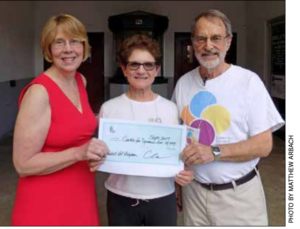
Carol Shaw, left, presents a check from the Community Foundation to CDCG founders, Aileen Kroll and John Buck.
The Center for Dynamic Community Governance (CDCG) and the Old Greenbelt Theatre (OGT) kicked off their year-long partnership on Tuesday, September 12. Carol Shaw of the Greenbelt Community Foundation presented a $4,777 check to CDCG founders Aileen Kroll and John Buck at a ceremony attended by members of the public and the city council.
The focus of this partnership is on volunteerism. The OGT relies on volunteers to perform duties such as concessions, outreach and publicity/marketing. They are part of a three-tier structure that includes a board, staff and volunteers. The CDCG looks to enhance and strengthen the volunteer component using their precepts which center on consensual decision-making, transparency and open communication.
The CDCG seeks to revitalize the volunteer system at OGT as efficiently and harmoniously as possible this year, says CDCG member Aileen Kroll. The goal is to enhance organization and open up the channels of communication, where everyone is valued and maximum benefit for all is achieved. She wants to ensure that OGT volunteers are a diverse group, a factor which they hope to increase by reaching out to local universities, places of worship and community organizations. A volunteer coordinator position may be created. Ultimately, a model of board, staff and volunteers will be created that can be replicated elsewhere in Greenbelt and beyond.
Cathy Jones, board chair of the Friends of Greenbelt Theatre (FGT), hopes to implement a good structure that will be ongoing. The partnership came out of the use of CDCG approaches in their monthly meetings. Since receiving their contract from the City of Greenbelt in spring 2015, the nine-member FGT board acts Partnership Aims to Boost Volunteerism at Theater by Matthew Arbach as a steering committee to manage the operations of the theater as a community based non-profit.
The process of change will occur through connecting with the community and all those involved with the OGT, to ascertain their needs, concerns and ideas for making the system better. Questionnaires will also be used.
The OGT, built in 1938, is “an astonishing resource,” says Kroll. It provides reasonable ticket prices, frequent speakers on relevant topics and many free showings, as well as hosting many events open to the public. Most of the concessions sold are from local vendors. Volunteers are allowed free viewings of films.
